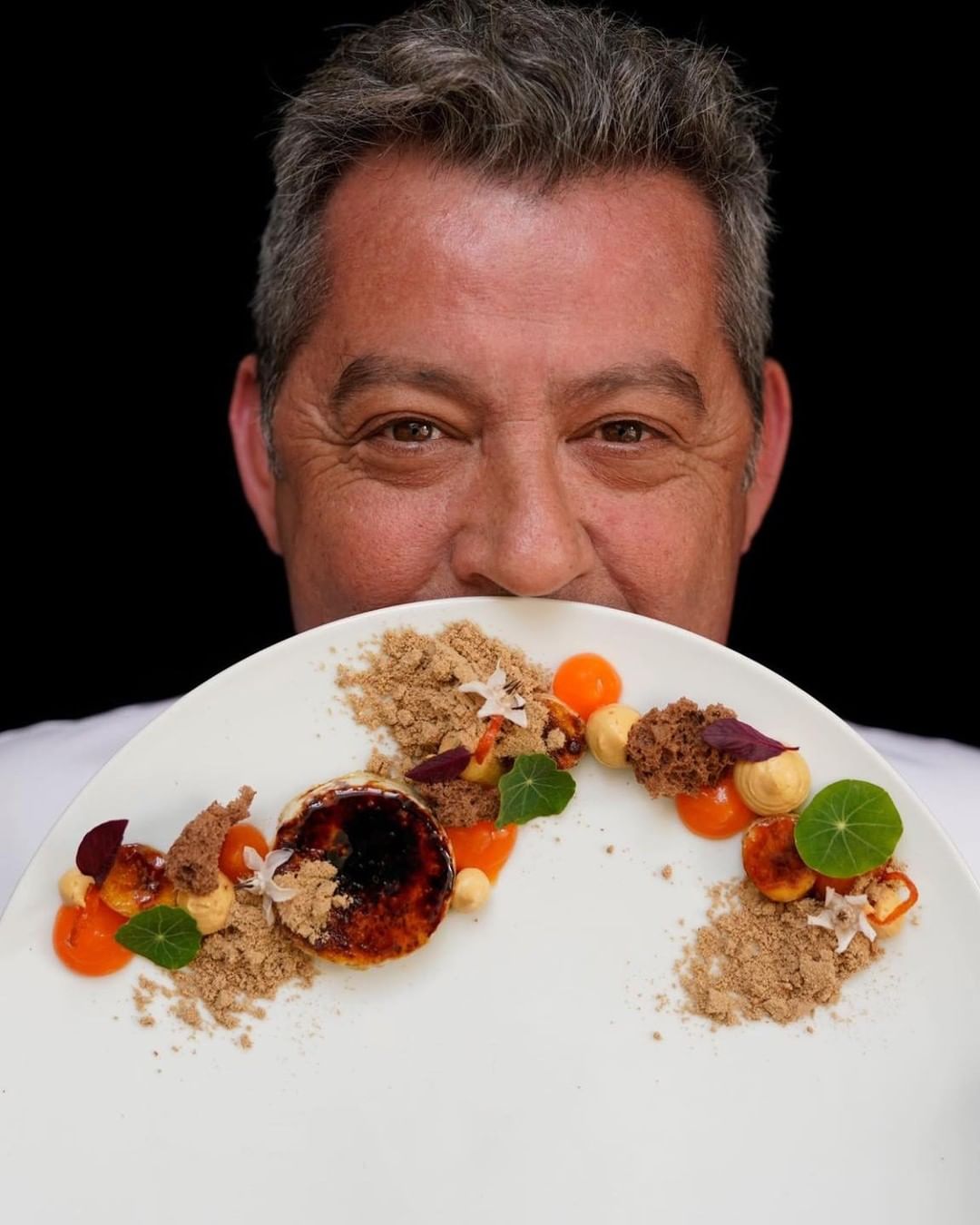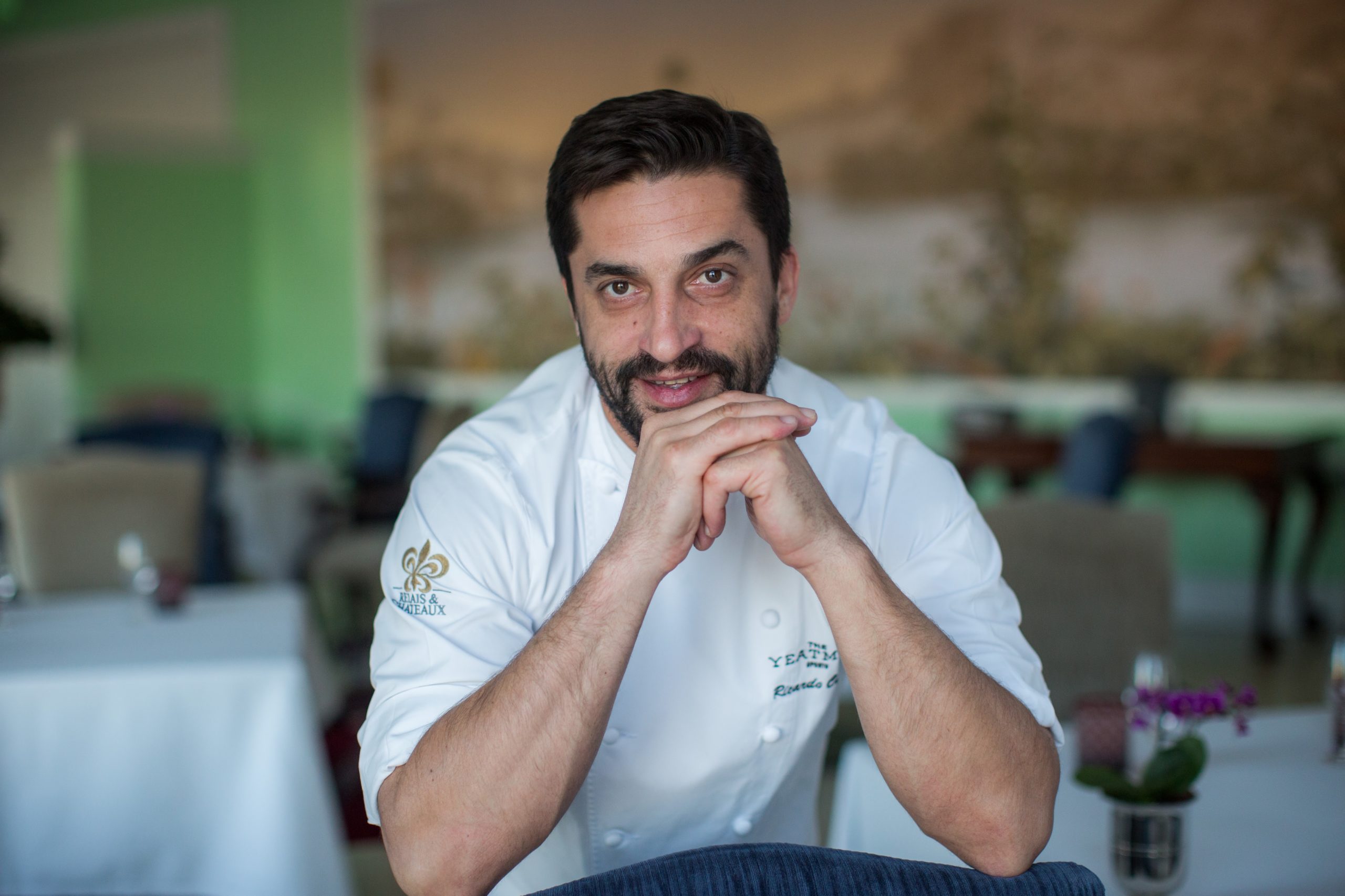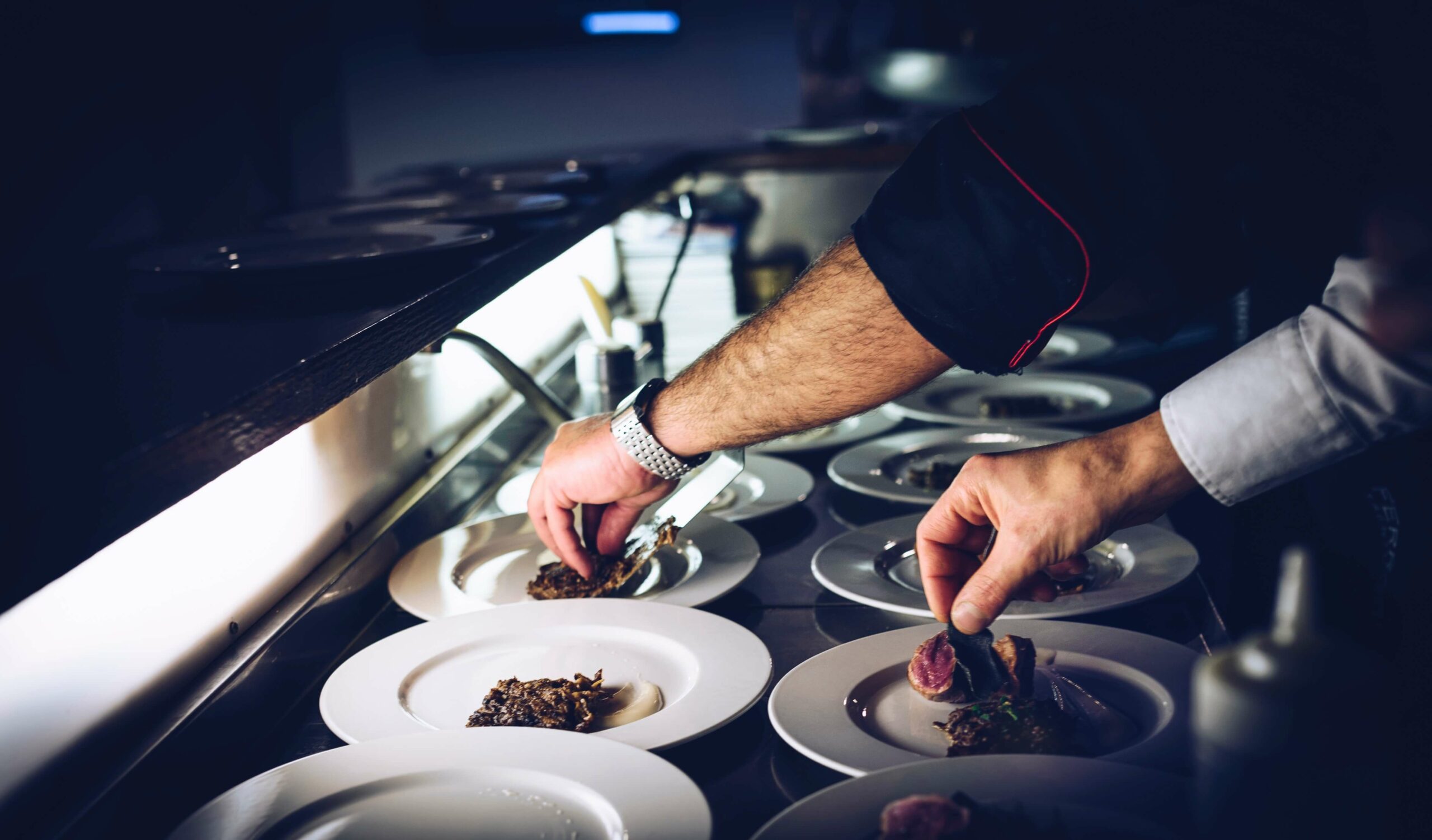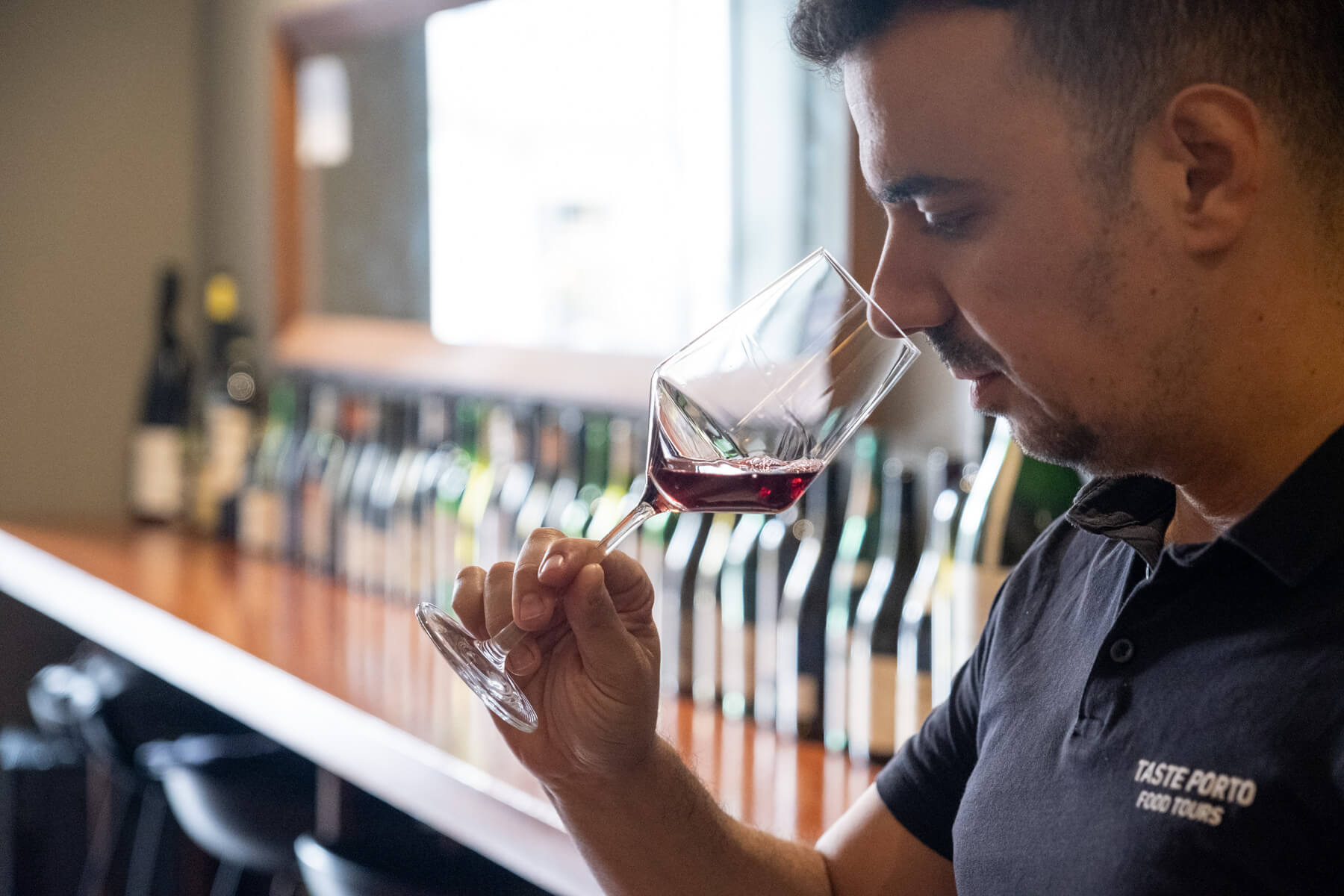
One Chef at a time – Meet Rui Paula, Michelin star chef in Porto
This interview was conducted online during the pandemic, providing insights into the restaurant’s situation at that particular time. Rui Paula was elected the National Chef of the Year 2020 and today shares his passion with 3 different projects: DOC, DOP and Casa de Chá da Boa Nova (a Michelin 2-star restaurant). In this interview (or foodie talk, as we like to call it), Chef Rui Paula reveals his thoughts and feelings about food. Continue scrolling to read the original interview below (in Portuguese).
You are the National Chef of the Year 2020 and the owner of some of Portugal’s most respected restaurants, one of which (Casa de Chá da Boa Nova) was recently awarded the second Michelin star. 2020 was quite a year! But the celebration must have been spoiled by the pandemic. What plans do you have to celebrate it properly in the future?
Yes, it was supposed to be quite a year. It is better to put it that way: “it was supposed to”. Because it really wasn’t! It had everything to be the best year of my life, in fact, we were sold out until the end of 2020, but all reservations were canceled due to coronavirus. And, for a few months, we were in survival mode. We went through a rough phase, the planning … I did what I had to do. I opened a shop at Norteshopping, I did everything to keep my employees, but it really was a very difficult phase. I don’t know what else to say, I don’t know what else I could have done to reinvent myself. We had a takeaway at the DOC, it didn’t pay the bills, so…
Let’s go back a few years. Your career started at the Cêpa Torta restaurant, in Alijó, Vila Real district, over 20 years ago. Do you still have dinner or lunch at Cêpa Torta from time to time?
Unfortunately, I no longer go out to eat at Cêpa Torta restaurant. I am proud that the restaurant remains open. The place is ours but, given my busy life, I don’t have time to visit it anymore. I get feedback from other people who go there and everyone tells me that it’s still a restaurant where you can eat very well.
Looking back, what did you like most about Cêpa Torta: was it your grandmother’s food? Or the charming atmosphere of the restaurant?
I think it was more the food that I cook there. It was a family house, a farmhouse, and people enjoyed the food. And the restaurant was really beautiful, but then I had the unfortunate idea of taking those woods out and modernize the restaurant and that’s one of the few things I regret the most. The restaurant was quite beautiful when I opened it and, in fact, it should be kept that way. The food was homemade food, comfort food, and people enjoyed it a lot.
In Portugal you did culinary internships with Miguel Castro Silva and José Cordeiro; in London, you worked with Anthony Almond; and then, in Spain, one more culinary internship with the Roca brothers. Can you list some of the things you learned from these chefs?
- Miguel Castro Silva taught me everything about low-temperature cooking methods, at the time not many chefs were talking about it. Miguel had very well-defined concepts.
- London was a good experience because I got the chance to work with a famous chef and we were focused on international food.
- Roca was the one who opened my spirit to the new paths of gastronomy.
Of course, in the middle of all these learning experiences, one has to avoid copying others and find his own DNA, his own concept, which is what I am doing nowadays.
Currently, you share your passion with 3 different projects: DOC, DOP, and Casa de Chá da Boa Nova. We know that Sting went to DOP, in Porto; Bono visited Casa de Chá, in Leça; Who would you like to come to DOC?
I would love it to be Pope Francis because I think he is a very empathic Pope and I like him very much. He has very different ideas about (and for) the Catholic Church.
There are two premises that stand out in the interviews you gave in the pasts years: “there is no good gastronomy if the producer is not on our side” and “when customers sit at the table, they have to forget that they are in a restaurant”. In a sector as competitive as the restaurant industry, do you believe that these are the secrets to ensure customer loyalty?
Yes, that’s the way to go. There is a very important relationship between the producer and the entrepreneur (of the restaurant, in this case). We have to work with good products, then we have to pay the producer properly and on time (another secret), then we have to pay our team and we must have a well-defined concept for the restaurant… then we have to provide a good experience to our customers. And only with good products, with the bills up to date and with a well-defined concept of the food we want to make… will we make a difference.
We read somewhere that your favorite dish is octopus fillets with octopus rice and cabbages. A very Portuguese dish! Do you believe that chefs have a role in safeguarding the national identity?
Yes, I do believe that. We are responsible for keeping the traditional recipes alive. This way we ensure that everyone can taste good food. I was lucky enough to taste marvelous food and this is very important because this memory stays with us. And that’s when we realize how important the old recipes are. In other words, we can’t afford to lose the traditional recipes! Nowadays, I rely a lot on these Portuguese recipes, on these flavors, to later create my own dishes. So, yes, I do believe that chefs have a role in safeguarding the national identity.
During the lockdown, you shared several recipes that any person could try at home while the restaurants were not open. We got curious: if you had to eat one Portuguese meal for the rest of your life, what would it be?
Octopus filets with octopus rice.
What do you always avoid ordering on a menu?
I always order pretty much everything on the menu. When I go to a restaurant, I’m already curious about the menu, otherwise, I wouldn’t go. When I arrive at the restaurant, I surrender completely to the cooks and the waiters. If I don’t have a good experience, I analyze it afterward.
What’s your favorite region of Portugal (besides the Douro which, we know, you are deeply in love with)?
That’s a good question. I lived in Alentejo for 5 years and I like Alentejo a lot. There are good products in the region (the black pig, for example), the way the spices are used, the Alentejo bread. So, it is a region that I am very pleased with and that has a lot of potential.
And if we asked the same question to your taste buds, what would the answer be?
Alentejo. The black pig, all the sausages they have, the açordas, the cheeses, the lamb, the spices… my taste buds consider it all very appealing.
Let’s end with a drink. You’re sitting down in your fantasy bar. What’s in your glass?
I don’t go much to bares. But I do appreciate whisky very much.
PORTUGUÊS: You can read the original interview below.
É o “Chef do ano 2020” e o dono de alguns dos restaurantes mais conceituados do país, um dos quais (Casa de Chá da Boa Nova) distinguido, recentemente, com a segunda estrela Michelin. 2020 foi mesmo o seu ano, mas a celebração deve ter sabido a pouco. Que planos tem para celebrar a sério no futuro?
Realmente era o meu ano. É melhor aplicarmos esta palavra: era. Porque realmente não foi! Tinha tudo para ser, aliás tínhamos as reservas todas até ao fim do ano 2020, elas foram todas abaixo, e durante uns meses andámos aqui numa fase de sobrevivência. Atravessámos uma fase difícil, os planos… fiz o que tinha a fazer. Abri uma coisa no Norteshopping, fiz tudo para manter os meus funcionários, mas realmente foi uma fase muito difícil. Não sei o que dizer mais, não sei o que podia fazer mais para me reinventar. Fiz take-away no DOC, não pagava as contas, portanto…
Começou no restaurante Cêpa Torta, em Alijó, distrito de Vila Real, há mais de 20 anos. Ainda vai comer ao Cêpa Torta?
Infelizmente não vou comer ao Cêpa Torta. Tenho orgulho que o restaurante se mantenha. Acho que ainda está aberto efectivamente. O espaço é nosso mas também, dada a minha vida, não tenho esse tempo, mas recebo feedback de outras pessoas que lá vão e ainda é um restaurante onde se come e bem!
Olhando para trás, o que mais lhe agradava no Cêpa Torta: a comida da sua avó? Ou o ambiente encantador do restaurante?
Acho que era mais a comida que eu praticava, que era na base dessa casa familiar que tínhamos, uma casa de lavoura, e que as pessoas gostavam. E o restaurante era efectivamente muito bonito, mas eu depois até tive a infeliz ideia de tirar aquelas madeiras e pôr o restaurante mais moderno e é uma das coisas que me arrependo. Aliás, é das poucas coisas que me arrependo. Portanto o restaurante até era bem bonito quando o abri e de facto era assim que devia estar e a comida toda que estava à sua volta era uma comida muito caseira, muito de conforto, já bem apresentada na altura e as pessoas aderiram bastante bem.
Em Portugal fez estágios com o Miguel Castro Silva e com o José Cordeiro; em Londres, estagiou com Anthony Almond; e depois, em Espanha, com os irmãos Roca. Consegue enumerar o que aprendeu com cada um destes chefs?
Com o Miguel Castro Silva aprendi tudo o que era a baixa temperatura, na altura ainda pouco se falava disso. Tinha conceitos bem definidos. Em Londres foi uma boa experiência porque trabalhei com um chef famoso e com uma comida mais internacional. E o Roca foi quem me abriu o espírito para os novos caminhos da gastronomia. Claro que no meio disto tudo o que nós temos de fazer é, até passar alguma fase em que até tentamos copiar os outros (que é mau caminho!), só se encontra esse equilíbrio quando, depois destes ensinamentos todos, criamos o nosso ADN próprio, o nosso conceito próprio, que é o que estamos a fazer hoje em dia.
Atualmente, divide o seu talento nos restaurantes DOC, DOP e Casa de Chá da Boa Nova. Sabemos que o Sting foi ao DOP, no Porto; o Bono à Casa de Chá, em Leça; Quem gostaria que viesse ao DOC?
Ao DOC, adoraria que fosse o Papa Francisco, porque acho que é um Papa que é de facto empático, eu gosto muito dele e tem umas ideias muito diferentes para a Igreja Católica.
Há duas premissas que sobressaem nas entrevistas que deu anteriormente: “não há gastronomia bem feita se o produtor não estiver do nosso lado” e “quando os clientes se sentam a mesa, têm de esquecer que estão num restaurante”. Num sector tão competitivo como a restauração, acredita que estes são os segredos para garantir a fidelização dos clientes?
É de facto por aí. Mas efectivamente há uma relação muito importante entre o produtor e o empresário (da restauração, neste caso). Nós temos de trabalhar com produtos bons, depois temos de lhe pagar adequadamente e a tempo e horas (outro segredo), depois temos de pagar às nossas equipas e ter o nosso conceito bem definido… a partir daqui proporcionar aos clientes uma experiência boa. E só com bons produtos, com as contas em dia e com um conceito bem definido da comida que queremos fazer é que vamos marcar essa diferença.
Lemos algures que o seu prato preferido é Filetes de polvo com arroz de polvo e couves, um prato bem português. Acredita que os chefes de cozinha têm um papel na salvaguarda da nossa identidade? De que maneira?
Evidentemente que têm. Portanto, nós somos responsáveis por perperturar essas receitas. É a maneira de todos provarem uma comida boa. Eu tive essa sorte, tive a sorte de provar comida bem feita e isso é muito importante porque essa comida fica na nossa memória. E aí é que a gente percebe o quanto é importante este receituário. Ou seja, não se pode perder! E a prova disso é que ainda hoje eu me baseio muito nesse receituário, nesses sabores, para depois criar pratos meus. Portanto é uma obrigação de todos nós manter essas receitas.
Durante o confinamento, foi partilhando algumas receitas para os seus seguidores fazerem em casa, enquanto os restaurantes não reabriam. Ficamos curiosos: se tivesse de comer uma refeição tipicamente portuguesa para o resto da sua vida, qual seria a sua escolha?
Arroz de polvo com filetes de polvo.
Existe algo no menu de um restaurante que evite sempre pedir? Sopa, sobremesa…?
Eu peço sempre tudo. Quando vou a um restaurante, é porque já tenho curiosidade de ir. A partir daqui, entrego-me na mão dos cozinheiros e das pessoas de sala que me estão a atender para ter essa experiência. Se não tiver, aí é que faço a minha análise.
Sabemos que é um apaixonado pelo Douro. Qual é a sua segunda região favorita de Portugal?
Ora uma boa pergunta. Vivi 5 anos no Alentejo e também gosto muito do Alentejo. Tem produtos bons (o porco preto, por exemplo), a maneira como trabalham a erva, o pão que têm. Portanto, é uma região que me apraz muito e que tem muito potencial.
E se colocássemos a mesma pergunta às suas papilas gustativas, qual seria a resposta?
O porco preto, todos os enchidos que eles têm, as carnes, as açordas, os queijos, o borrego, as ervas que utilizam… isso tudo apela às minhas papilas gustativas.
Vamos terminar com uma bebida. Está sentado num bar e segura um copo. O que está lá dentro?
Eu não sou muito de ir a bares hoje em dia, mas eu gosto muito de whisky.


